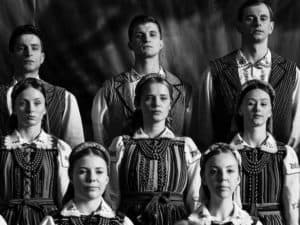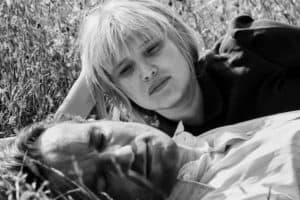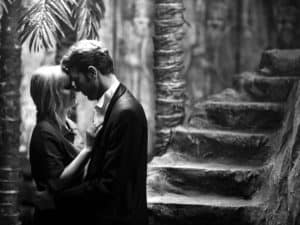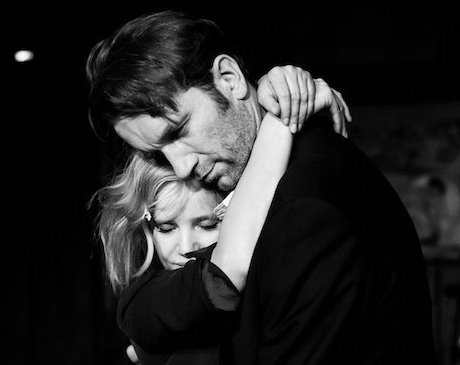In real life, an Impossible love affair is agony. But in cinema it’s the stuff of enchantment. Cold War is the captivating odyssey of such a love. Seductive music and obsessive love perfume this gorgeous black and white loveletter to director/screenwriter Pawel Pawlikowski‘s native Poland, captured with stark tenderness in this Oscar-nominated elegy.
A passionate pianist and a duplicitous singer fall desperately in love from the very start, and the film—shot in Poland, Croatia, and Paris— follows the vertigo of their searing connection. Their struggle to find a world they can live in mirrors the tensions besetting post WWII Poland, whose broken dreams form the background metaphor for the protagonists’ love.
A perfect film, Cold War is Polish director Pawlikowski’s loveletter to his native land, its traditions, its grim years during the Soviet era, and to his parents who provided the inspiration for the volatile and charismatic main characters.
 The lovers first make an electrifying connection when the young blonde Zula auditions for a Polish folksong and dance troupe, Mazurk, training to begin a tour of Eastern European cities. Wiktor (Tomasz Kot) is one of the music instructors, and when he hears Zula (Joanna Kulig) audition he is immediately drawn to her bright energy. She is as sensuous as he is brooding. But as he quickly learns, she has a checkered past, and uses the musical ensemble as a means of escape into a more exciting life.
The lovers first make an electrifying connection when the young blonde Zula auditions for a Polish folksong and dance troupe, Mazurk, training to begin a tour of Eastern European cities. Wiktor (Tomasz Kot) is one of the music instructors, and when he hears Zula (Joanna Kulig) audition he is immediately drawn to her bright energy. She is as sensuous as he is brooding. But as he quickly learns, she has a checkered past, and uses the musical ensemble as a means of escape into a more exciting life.
The theme—lovers who cannot quite find the right timing—and its variations take the action from the peasant villages of Poland, where we first meet Wiktor recording the song “Two Hearts,” a folksong that will evolve throughout the film, played and sung in many variations, and ultimately become a successful record made by the two protagonists during their time in Paris.
 With post-war Poland still in ruins, the folkloric troupe quickly becomes a sensation. And the success of this touring musical showcase comes to the attention of the communist propogandists, who intervene with the request that more state propaganda be added to the productions. The lovers plan to escape to the West during one of the performance dates in Berlin. But fate steps in, and when they finally meet again it’s two years later in Paris, where he plays piano in smoky jazz clubs and she escapes the Iron Curtain thanks to an Italian husband.
With post-war Poland still in ruins, the folkloric troupe quickly becomes a sensation. And the success of this touring musical showcase comes to the attention of the communist propogandists, who intervene with the request that more state propaganda be added to the productions. The lovers plan to escape to the West during one of the performance dates in Berlin. But fate steps in, and when they finally meet again it’s two years later in Paris, where he plays piano in smoky jazz clubs and she escapes the Iron Curtain thanks to an Italian husband.
 Life in exile from their beloved Poland proves to be the one pain the two cannot exorcize, as each in his and her own way keep making arrangements with the West, breaking each other’s hearts again and again, and then finding each other, again and again.
Life in exile from their beloved Poland proves to be the one pain the two cannot exorcize, as each in his and her own way keep making arrangements with the West, breaking each other’s hearts again and again, and then finding each other, again and again.
Nothing can keep them apart. Or together. And the film’s genius lies in showing us the angst of a love that, while obviously deep and true, is subject to the destructive influence of post-war ruin, the neferious Soviet surveillance system, and the mercurial personalities of the lovers themselves.
What a feast for the eyes! The two lead actors burn for each other and their wildly erratic passion seems to sear the screen itself. It is a sensuous treat to watch them storm and fight, dance, love, and weep, stricken by the depth of their feelings for each other trapped in an uneasy halfway house of history.
Pawlikow ski’s musical score is as much a player in this richly atmospheric film as is the bleak beauty of the country itself. From the haunting folk songs, collected and recorded at the start of the film so that Wiktor and his musical partner can shape the concert that Mazurk will perform, to the earthy, smoky blues and searing bebop of the jazz clubs. The sounds and blazing camerawork fuse to create scenes and moments of almost magic realist intensity.
ski’s musical score is as much a player in this richly atmospheric film as is the bleak beauty of the country itself. From the haunting folk songs, collected and recorded at the start of the film so that Wiktor and his musical partner can shape the concert that Mazurk will perform, to the earthy, smoky blues and searing bebop of the jazz clubs. The sounds and blazing camerawork fuse to create scenes and moments of almost magic realist intensity.

Stunningly shot by cinematographer Lukasz Zal (who similarly turned Pawlikowski’s Ida, into an Oscar-winning masterpiece of unflinching nostalgia.), Cold War liberates 21st century viewers from our own political maelstroms and internet-driven minutiae. It is bracing to be confronted with recent history that feels so very far away, and yet whose harrowing failures we continue to repeat.

Graced by a spectacularly perfect ending, the film will break your heart.
You won’t see many films like this, and Cold War will make you rethink the dominance of color cinema. Without all the extraneous information of color footage, we are able to see Pawlikowski’s grimly beatific Poland all the more clearly. This is black and white that throbs and burns with life and color.


